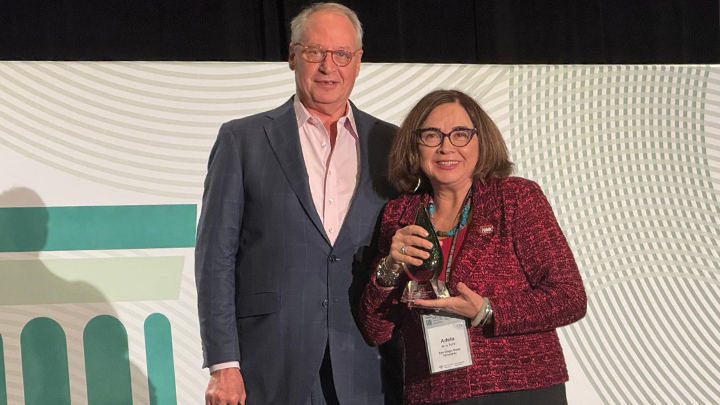SDSU lands International Impact Award for driving global engagement across the university
The Association of Public and Land Grant Universities recognized SDSU for its wide ranging commitment to global initiatives

San Diego State University has won the 2024 International Impact Award for Global Engagement from the Association of Public and Land Grant Universities (APLU), highlighting the university’s internationalization programs rooted in education diplomacy.
The award recognizes SDSU’s initiatives that drive greater global engagement across its campuses and beyond. With nearly 250 members, APLU is a research, policy and advocacy organization for public research universities, land-grant institutions and state university systems. The University of Florida also was honored by APLU with an International Impact Award for Global Teaching and Learning.
“While I have the honor of accepting this award on behalf of SDSU, it is truly a reflection of the hard work and commitment among our faculty, students and staff to extend the positive impact of the university beyond our region and borders,” said SDSU President Adela de la Torre. “We are honored to be recognized by APLU and peer institutions that clearly recognize the important role public universities play in building stronger global connections and understanding.”
SDSU’s programs in Oaxaca, Mexico, the Republic of Georgia, and the island of Palau, along with its extensive cross-border engagement in Mexico and Latin America, were the cornerstones of the university’s application for the APLU award.
“SDSU’s international reach is larger than many realize,” said Cristina Alfaro, associate vice president of International Affairs. “For a decade, we’ve partnered with universities in the Republic of Georgia to address a STEM worker shortage there, and we’ve been educating teachers in the island of Palau for years to assist in nation building. On top of that, we provide numerous transborder opportunities in Latin America and opened the SDSU Center for Mesoamerican Studies in Oaxaca, Mexico. We are grateful to the APLU for recognizing these efforts with a prestigious International Impact Award.”
Oaxaca has long been a hub for SDSU transborder programs and research, a linkage with ties to the university’s Aztec moniker. California is home to the largest population of Oaxacans outside of Oaxaca itself, and two dozen SDSU Faculty have active research projects in Oaxaca across several academic disciplines. In 2022, SDSU opened the Center for Mesoamerican Studies in Oaxaca.
“For us, traveling to Oaxaca and engaging students and faculty, we have a criteria that whatever project we do, it must be one that empowers the community,” said SDSU Anthropology Professor Ramona Pérez, director of the Center for Latin American Studies, and chair of the Aztec Identity Initiative. “We are not extractive or exploitative. We are proud of the way we teach.”
SDSU Georgia in Tbilisi offers accredited U.S. degrees in STEM fields in collaboration with top Georgian universities at the crossroads of Eastern Europe and Western Asia. Since 2014, more than 520 students have achieved degrees and started careers. Women make up 40 percent of these graduates.
“What started as a partnership to alleviate a shortage of STEM workers has blossomed into a shining example of the power of fostering political and economic democracy through education,” said Halil Guven, Dean of the SDSU Georgia program.
In Palau, an island nation that achieved its independence in 1994, SDSU has partnered with a local community college to offer interdisciplinary undergraduate and graduate degrees centered around education. Since 2005, the programs have produced more than 250 graduates, many of whom remain in Palau to contribute to building the workforce and community.
“Congratulations to the University of Florida and San Diego State University on winning the APLU International Impact Awards,” said APLU President Mark Becker. “We’re delighted to recognize public research universities that are major drivers of progress through their global efforts both on campus and abroad.”



